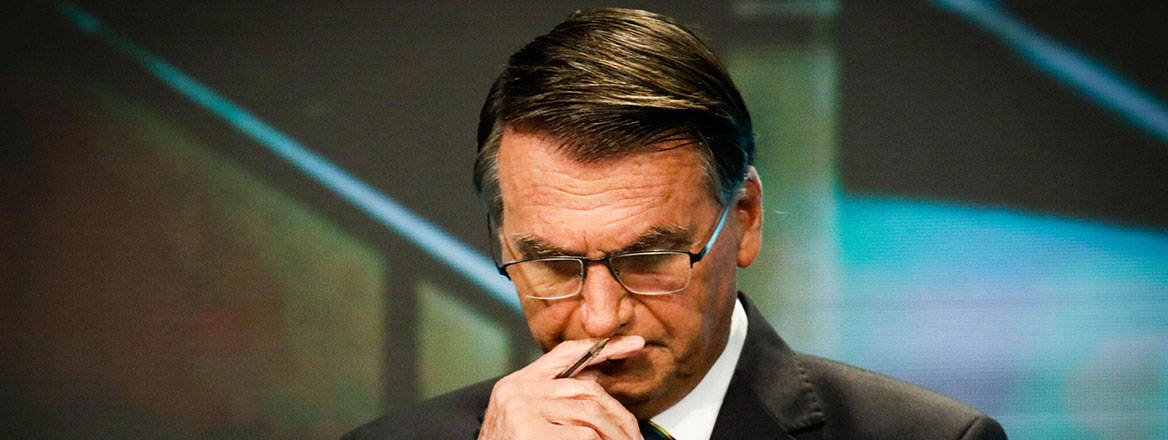A Stress Test for Brazilian Democracy
The likely winner of Brazil’s presidential election will want to return the South American country to the global stage.
On Sunday, Brazilian voters face a choice between re-electing current President Jair Bolsonaro (Liberal Party), former President Luiz Inácio Lula da Silva (Workers’ Party), Ciro Gomes (Democratic Labour Party), Simone Tebet (Movimento Democratico Brasileiro) or a series of other minor candidates in the first round of the country’s presidential election.
Lula leads the polls with around 45–48% of voting intentions, against around 34–37% for Bolsonaro. Yet despite winning presidential elections four times – 2002 and 2006 against Lula, 2010 and 2014 against Dilma Rousseff – the Workers' Party has never elected a president without needing a second round. Lula has a real chance of achieving this for the first time, although this is not the most likely scenario: pollster Datafolha suggested Lula could clinch a first-round win, but everything points to a more cautious analysis that there will be a second round of voting, scheduled to take place on 30 October 2022.
Bolsonaro’s Predicament
It is quite rare for a sitting Brazilian president to run on the eve of elections so far behind a challenger. So, how did Bolsonaro get into this predicament?
Since the beginning of his term in January 2019, Bolsonaro has sought to act against the country's main political institutions – especially against the Federal Supreme Court. The eruption of the coronavirus pandemic in March 2020 considerably hardened his stance. He was elected in 2018 on an anti-corruption agenda and with the help of the partial success of Operation Lava Jato (Operation Car Wash), a criminal investigation which exposed vast corruption networks among Brazil’s political elite. That operation was led by federal judge Sergio Moro, who would become Bolsonaro’s minister of justice. That, plus the promise that the new administration would have no truck with corruption in the National Congress, is what propelled Bolsonaro to power.
But after his disastrous behaviour during the pandemic when – mimicking US President Donald Trump – Bolsonaro advocated ineffective ‘medicines’ such as chloroquine and then criticised the efficacy of vaccines, the president found himself at risk of impeachment. So, he decided to team up with federal deputy Arthur Lira and other unsavoury characters in the Chamber of Deputies, to guarantee a ‘shield’ against impeachment. And Lira created the Secret Budget scheme, revealed by the newspaper O Estado de S. Paulo, through which federal deputies and senators suggested and obtained budget amendments they wanted without democratic transparency.
Bolsonaro has also started to insinuate that there is recurrent electoral fraud in Brazil, putting the suitability of the Superior Electoral Court in doubt among its supporters
Unable to lead a clear legislative agenda, but without risk of impeachment, Bolsonaro began to focus his efforts on attacking the Federal Supreme Court – in particular, some of the more liberal judges, such as Alexandre Moraes and Luís Roberto Barroso. As a result, institutional tension increased, precisely the opposite to what Bolsonaro promised to do.
Bolsonaro has also started to insinuate that there is recurrent electoral fraud in Brazil, putting the suitability of the Superior Electoral Court in doubt among its supporters. That is why it is believed he will not respect defeat if Lula wins in the first or second round.
It is a sadly predictable and uncertain scenario. Although Bolsonaro does not count on the support of the majority of society to carry out a self-coup – and it is unlikely that he will be supported by the majority of the military, business and other relevant sectors – we might expect confusion and violence next week. Let us hope this is wrong.
Challenges for a Victorious Lula
According to the Genial/Quaest survey, a runoff between Lula and Bolsonaro should give the Workers’ Party candidate the win with just over 50% of the votes. Half of Ciro Gomes’s supporters say they will support Lula. Brazilians are largely worried about the economy, inequality and health matters. In these, Lula has an advantage over Bolsonaro who prevails among voters concerned with corruption, violence and education policy. When asked ‘which option gives you the most fear’, 45% said the continuing of Bolsonaro versus 41% saying the return of the Workers’ Party. Regionally, Lula fares better in the Northeast, Southeast and NorthCentre East of the country, but loses to Bolsonaro in the richer South.
The presidential electoral system follows the two-round model, like that used in French elections. A candidate who receives more than 50% of the total valid votes cast in the first round is elected outright. However, if no candidate enjoys that majority, the two candidates who receive the most votes in the first round participate in a second round of voting. The candidate who receives the most votes in the second round is elected as Brazil’s next president.
Lula da Silva has steadily lured moderate voters who saw his commitment to the centre after selecting a centrist running mate, former Sao Paulo Governor Geraldo Alckmin – his rival in the 2006 election. Observers argue that the move ‘showed Lula was serious about a broad coalition, but raised questions about what concessions he made’.
The former head of state’s inner circle has advocated for economic policies to be at the top of the agenda. For that, he has slipped the intention to name a seasoned politician as his finance minister with good relations with Congress and real knowledge of public finances. Lula will have to prove economically efficient to the private sector which sided with Bolsonaro’s early plans for privatisation and pro-business reforms.
It is expected that, if elected president, Lula will try to re-establish Brazil as a global player
It is believed that Lula will continue shifting gears to the political centre. Lula’s initial priority will be to pass complex tax reform to tackle inequality and income distribution. Lula will also have a difficult task in dealing with large enterprises such as Petrobras (Brazil’s state-run oil company) and Correios (the country’s postal service) which are undergoing privatisation after recent financial turmoil and the value of shares plunging.
Return of the BRICS?
The BRICS (Brazil, Russia, India, China and South Africa) group of economies gained much attention during Lula’s former tenure but quickly revealed asymmetries that limited economic interdependency among these economies. Lula used the group to send a message that large developing economies could offer an alternative to the global economic order.
It is expected that, if elected president, Lula will try to re-establish Brazil as a global player. Lula is expected to rekindle the country’s foreign policy by bringing the BRICS back to life.
He will aim to do so as a neutral figure who can partner with both Western and anti-Western leaders. On the one hand, Lula will need to deal with increasing Chinese pressure for trade. Currently, Beijing is Brazil’s top partner for both exports and imports. On security matters, on the other hand, Brasilia has moved closer to Washington. In 2019, the US government gave the South American country the status of a ‘major non-NATO ally’, granting it significant benefits and privileges for defence cooperation including training, weapons acquisition, and exchanges on key matters such as satellite information and cybersecurity.
Lula has actively campaigned for the BRICS to have a role in bringing peace to the war in Ukraine. He has established his own channels of communication with foreign diplomats from Russia, India and South Africa along with other envoys from Germany, France, Switzerland, the Netherlands and Poland.
Lula’s ‘middle power’ agenda should include laying the road for a trade agreement with the EU, revamp the languishing Mercosur (Southern Common Market), and securing the country’s accession to the Organisation for Economic Co-operation and Development. Lula will seek alliances with the recently established left-wing governments of Gustavo Petro in Colombia, Gabriel Boric in Chile, and those already in office such as Andrés López Obrador in Mexico and Alberto Fernández in Argentina.
The comeback of a ‘pink tide’ (a series of left-leaning governments that came to power in late 1990s and early 2000s with strong social programmes and apathy for neoliberal economic orthodoxy), nonetheless depends on these countries’ stamina to engage in multilateralism and common problems affecting the region �– from the collapse of governance in Haiti to the humanitarian crisis in Venezuela. Just like the other younger BRICS democracies (that is, India and South Africa), Petro, Boric, López Obrador and Fernández have more stringent domestic priorities to solve. They might as well leave the internationally seasoned and entrepreneurial Lula to lead regional diplomacy. This is an opportunity he will unquestionably use to his advantage.
The views expressed in this Commentary are the authors’, and do not represent those of RUSI or any other institution.
Have an idea for a Commentary you’d like to write for us? Send a short pitch to commentaries@rusi.org and we’ll get back to you if it fits into our research interests. Full guidelines for contributors can be found here.
WRITTEN BY
Dr Sérgio Praça
Dr Carlos Solar
Senior Research Fellow, Latin American Security
International Security
- Jim McLeanMedia Relations Manager+44 (0)7917 373 069JimMc@rusi.org


